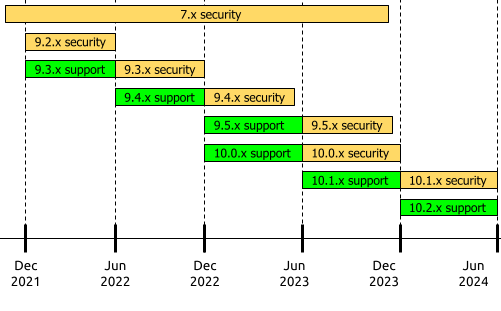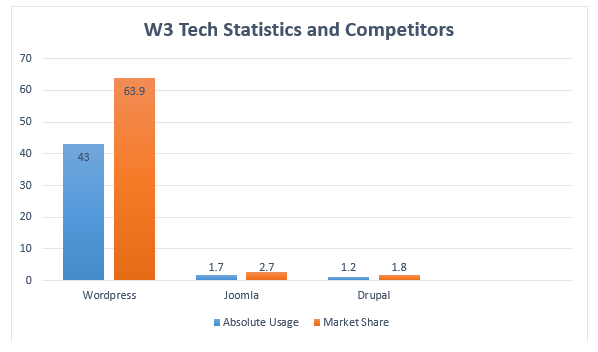
About Drupal:
Drupal is a Free and Open Source Web Content Management System (CMS) written in PHP release on 15 January 2001. Drupal Provides a Powerful Backend for at least 14% of the top 10000 websites worldwide and 1.2% of Top 10 Million Website Ranging from Top Blogs, News portals, Political, Corporate House and Government portals. Drupal has at least 1400 distributions that allow users to quickly and easily set up complex website structures.
As on December 2022, the Drupal Community had more than 1.39 Million Members, including 1,24,000 users actively contribution to more than 49000 Free Modules that extend and customized Drupal Functionality over 3000 Free themes. Drupal core available basic features like user account registration and maintenance, menu management, taxonomy, page customization, and system administration.
Drupal has built core with Symfony web framework. So Drupal also describes as web application framework. When compare with other notable framework, Drupal meet the most of generally accepted feature requirements for such frameworks. Drupal Support Apache, Nginx, Microsoft IIS and PHP built in Server.
Drupal CMS basic needs the latest Desktop and Mobile Browsers like Google Chrome, Mozilla Firefox, Apple Safari, Microsoft Edge and Opera. Drupal require latest PHP to securing it Core. Drupal at least support PHP Version 7.3 to PHP 8.1. Requirement Change according to installed drupal version.
Drupal Runs on any Computing Platform that supports both a Web Server and Required Browser to run a PHP script and database to store content and configuration.
Short History of Drupal:
Drupal was originally written by Dries Buytaert as a message board for his friends to communicate in their dorms while working on his Master’s degree at the University of Antwerp. After graduation, Buytaert moved the site to the public internet and named it Drop.org.
The name Drupal represents an English rendering of the Dutch word druppel, which means Drop. The name came from the now-defunct Drop.org, whose code slowly evolved into Drupal. Buytaert wanted to call the site dorp for its community aspects, but mistyped it when checking the domain name and thought the error sounded better.
Drupal Features:
1.Flexible Content: Define custom fields that can be used across content types, users, comments, terms and other entities. Store the data for these fields in SQL, NoSQL, or use remote storage.
2.Better theming: Control exactly what gets shown where on the screen with the new Render API and some truly radical alter hooks. The new RDF module provides semantic web markup.
3.Accessible: Administration screens are now far more accessible. Many front-end improvements make it easier for you to build highly accessible websites.
4.Images and files: Adding images to content is now built in. Generate different versions for thumbnails, previews and other image styles. Private file handling can now be used alongside public files.
5.Automated code testing: A new automated testing framework with over 30,000 built-in tests allows for continuous integration testing of all Drupal core patches and contributed modules.
6.Improved database support: A new database layer provides out-of-the-box support for SQLite, MySQL/MariaDB, and PostgreSQL. Install contributed modules to use MS SQL Server, Oracle, and more.
What’s new in Drupal 10?
1.Claro Administration Theme
2.Introduction to latest CKEditor5 with better Experience and modern editing
3.Modern Javascript Components to replace uses of JQuery
4.Theme Starterkit tools for bespoke theme creation.
5.Symfony 6 Under the Hood and PHP 8.1 required to keep the system secure.
6.Automatic Updates modules apply patch level updates to Drupal Core.
7.Project Browser makes it easy for site builders to find modules and themes.
8.Decoupled Menu a functionality that’ll allow you to easily update the menu from the administration panel.

Version | Release Date | Active Support | Latest |
Drupal 10 | January 17, 2024 | 1 July, 2024 | 10.2.2 |
Drupal 9 | June 3, 2020 | End-of Life | 9.59 |
Drupal 8 | November 19, 2015 | End-of-Life | 8.9.20 |
Drupal 7 | January 5, 2011 | 01 Jan, 2025 | 7.99 |

References:
1. Drupal Wikipedia (About, History and Features). – Drupal Wikipedia
2. End of Life ( Extended support) – End of Life
3. Drupal 10 Latest Features – Drupal Latest Features
4. What Features Drupal Bring Out – Expected Features in Drupal
5. Tech Statistics About Drupal – W3Tech Latest Statistics
6. Release Date of Drupal Latest Version – Drupal Release Date
7. What to expect in Drupal 10 – New Features in Drupal 10
8. New Drupal Features – Features of Drupal
9. WordPress vs Drupal – WordPress vs Drupal
10. Drupal Usage Statistics – Current Drupal User
